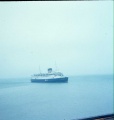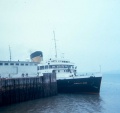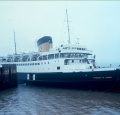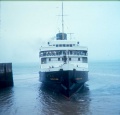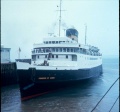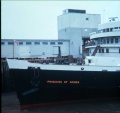Dominion Atlantic Railway Digital Preservation Initiative - Wiki
Use of this site is subject to our Terms & Conditions.
Difference between revisions of "SS Princess of Acadia (I)"
| Line 1: | Line 1: | ||
===SS Princess of Acadia (I)=== | ===SS Princess of Acadia (I)=== | ||
| + | |||
| + | This Princess was a Steam Ship. After being replaced by the MV Princess of Acadia, she was converted to haul traffic between the mainland and Newfoundland and renamed the Henry Osborne. She was wrecked outside of St. John and sold for scrap.<ref>[[:Category:Edward S. Gray|Edward S. Gray]] in a letter received March 28. 2011.</ref> | ||
==Gallery== | ==Gallery== | ||
| Line 26: | Line 28: | ||
==References and Footnotes== | ==References and Footnotes== | ||
| + | <references /> | ||
==External Links== | ==External Links== | ||
Revision as of 15:53, 28 March 2011
SS Princess of Acadia (I)
This Princess was a Steam Ship. After being replaced by the MV Princess of Acadia, she was converted to haul traffic between the mainland and Newfoundland and renamed the Henry Osborne. She was wrecked outside of St. John and sold for scrap.[1]
Gallery
Princess of Acadia Docking Sequence
In these photos from the summer of 1966, "POA Digby Wharf 1966" photos 1, 2, 3, 4, 5, 6 & 7 show how they got the Princess of Acadia into the government wharf. She would steam slowly in and a line would be thrown to the wharf, they would tie it up on the post (bollard) at the end (photo 2, but seen much better in this shot from J.A.M. and this shot from J.A.M. as well) and she would rotate into the docking area. If you look carefully at the water currents in shot numbers 3 & 4 (the bows on shot), you will notice that she had a bow thruster (the eddies on the bow) added when she was refitted for St. John -Digby Service. Her predecessor the Princess Helene once was caught by the wind after she backed away from the wharf and it took her close to hour to get her bows pointed toward the gut. My father, who was much more nautical than I, described her as being "In-Irons". Sailing ships in this condition would launch a boat and the crew would then row or kedge her so the wind would catch the sails. The bow thruster eliminated this condition and made her quite handy to dock on her own or to turn her around at St. John.
References and Footnotes
- ↑ Edward S. Gray in a letter received March 28. 2011.
